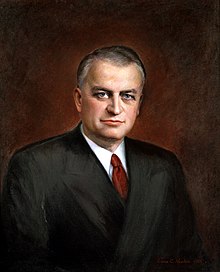Kenneth Wherry
| Kenneth S. Wherry | |
|---|---|
 |
|
| Senate Minority Leader | |
|
In office January 3, 1949 – November 29, 1951 |
|
| Deputy | Leverett Saltonstall |
| Preceded by | Alben W. Barkley |
| Succeeded by | Styles Bridges |
| Senate Majority Whip | |
|
In office January 3, 1947 – January 3, 1949 |
|
| Leader | Wallace H. White, Jr. |
| Preceded by | Lister Hill |
| Succeeded by | Francis Myers |
| Senate Minority Whip | |
|
In office January 3, 1943 – January 3, 1947 |
|
| Leader |
Charles L. McNary Wallace H. White, Jr. |
| Preceded by | Felix Hebert |
| Succeeded by | Scott Lucas |
|
United States Senator from Nebraska |
|
|
In office January 3, 1943 – November 29, 1951 |
|
| Preceded by | George W. Norris |
| Succeeded by | Fred A. Seaton |
| Member of the Nebraska Senate | |
|
In office 1929-1932 |
|
| Personal details | |
| Born |
February 28, 1892 Liberty, Nebraska |
| Died | November 29, 1951 (aged 59) Washington, D.C. |
| Political party | Republican |
Kenneth Spicer Wherry (February 28, 1892 – November 29, 1951) was an American businessman, attorney, and politician. A member of the Republican Party, he served as a U.S. Senator from Nebraska from 1943 to 1951. He was Senate Minority Leader from 1949 to 1951.
Wherry was born in Liberty, Nebraska, to David Emery and Jessie (née Comstock) Wherry. He received his early education at public schools in Pawnee City, and graduated from the University of Nebraska (where he was a member of Beta Theta Pi) in 1914. From 1915 to 1916, he studied business administration at Harvard University. During World War I, he served in the U.S. Navy Flying Corps (1917–18).
Following his military service, Wherry began a business career selling automobiles, furniture, and livestock; he was also a licensed undertaker with offices in Nebraska and Kansas. He also studied law and, after being admitted to the bar, entered private practice in Pawnee City.
Wherry entered politics as a member of the Pawnee city council, serving in 1927 and 1929. He was mayor of Pawnee City from 1929 to 1931, simultaneously serving as a member of the Nebraska State Senate from 1929 to 1932. He was an unsuccessful candidate for the Republican nomination for Governor in 1932 and for U.S. Senator in 1934.
...
Wikipedia
